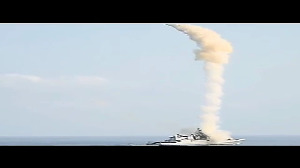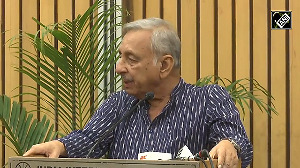November 10, 2003. That day, the Multi-Commodity Exchange of India opened its doors. Just a month later, it was joined by the National Commodity and Derivatives Exchange.
Together, they created a new asset class - commodity futures - that investors could use to diversify their portfolios.
Now, three years on, trading volumes on NCDEX and MCX are comparable to that of the equity cash market (NSE and BSE), although much smaller than that of equity derivatives (NSE).
While MCX's volumes come mainly from gold, silver and crude oil, those of NCDEX are driven by agri-commodities. There is also the smaller, Ahmedabad-based National Multi-Commodity Exchange of India.
The volume growth has been driven by two major factors. First, the target group of the commodity markets - farmers, middlemen, oil companies, oil dealers, agri commodity dealers and jewelers - are using derivatives to lower business risk.
Second, day traders and speculators are using the platform to gain from price swings of volatile commodities (different commodities are volatile at different times of the year).
Retail investors, by and large, have fought shy of CF. If you are an equity investor and want to try your hand at CF, you must keep a few things in mind.
Streets apart, but meet at derivatives junction. Listed companies are many, but the underlying investment instrument is common - dematerialised shares. So, an equity portfolio diversified across shares of several companies can be held in a single demat account indefinitely without altering the nature of the instrument.
Commodities is different. If, say, you buy tur dal, steel, gold and crude oil from the spot market, you cannot hold them at a single point. Perishable agri-commodities need hygienic and pest-free storage places, ferrous metals need large warehouses, precious metals need theft-proof safekeeping, and inflammable commodities need fireproof barrelling.
That's too much to manage for a retail investor. But you can invest in derivatives on NCDEX, MCX and NMCE - albeit, with a restraint of the investment horizon being short term.
A futures contract is a trade to buy or sell an underlying (usually a product) at an agreed price on a fixed later date (expiry date), which is also the date for delivery (cash settlement).
Buying or selling futures contracts of near-month, next-month and third-month expiry and, in a some cases, of six-month expiry, are the only viable options for getting a commodity exposure.
ICICIdirect.com is a division of ICICI Brokerage Services and a member of NCDEX and MCX. Says its chief manager B. Karthikeyan: "Anyone who is trading for the short-term in the equity cash market or in equity derivatives, which, by its very nature, is short-term, can find similar opportunities in commodity derivatives."
But there is one big difference. Commodities derivatives trading, though regulated by Forward Markets Commission, is governed by the Forward Contracts (Regulation) Act, 1952.
This Act does not allow options trading, an essential derivatives tool for managing risk. Options allow you to buy or sell an underlying without having to pay or deliver on the expiry date if the settlement price vis-a-vis your options traded price is causing a loss.
Your maximum possible loss is a market-determined premium that you have to pay on the trade. In the US and the UK, commodity derivatives are as big as equity derivatives. But almost all the exchanges allow options trading along with futures trading - and volumes in the former are usually bigger.
To get going. NCDEX and MCX together offer futures contracts in around 60 commodities, 45 of them common to both. The lists are available on www.ncdex.com and www.mcxindia.com (see NCDEX's Top 10). There are about 800 NCDEX brokers, who have about 12,000 trading terminals across 550 centres in the country and MCX's numbers are similar. So, the reach is as good as that of NSE or BSE. But at lower cost to the broker.
An NSE cash market member acquiring derivatives market membership has to shell out an additional deposit of about Rs 75 lakh (Rs 7.5 million), whereas an MCX member gives a deposit of only Rs 15 lakh (Rs 1.5 million) and an NCDEX member Rs 30 lakh (Rs 3 million).
You could trade on MCX and NCDEX through a common broker, or two different ones. NSE and BSE brokers, too, can become members of the commodity exchanges (using a separate, registered company) and you could trade through them as well.
In all cases, you have to mandatorily sign a separate client-member agreement that lays down the broad framework of your - and your broker's - rights and obligations.
Gradually, the ease of Internet-based trading is also being offered by commodity derivatives brokers. Internet-based trading platforms of equity brokerages are being extended to their commodity derivatives membership. ICICI Brokerage (via ICICIdirect), Geojit Commodities (www.geojit.com) and Man Financial Commodities (www.manfinancial.in) are three of 10-15 brokers that offer NCDEX futures contracts on their websites. None offer MCX contracts on the Net yet.
Costs. Brokerage rates are 0.03-0.06 per cent of the value of CF contracts, similar to equities. The cost of opening an account varies too. One at ICICI Brokerage would set you back by Rs 500 and requires you to have a icicidirect.com account for equity trading (Rs 750 more). Man Financial, however, would open your account for Rs 350 and would not insist that you become its equity client too.
The rates inch up if you give or take delivery; you are discouraged from doing so. When this correspondent approached Man Financial as a potential client, a sales agent evaded the query. "You can just roll over your contract before expiry to the next month's contract," he suggested.
Settlement. Says ICICIdirect's Karthikeyan: "Of the 50 commodity contracts on NCDEX, six-seven involve compulsory delivery on expiry, six-seven are compulsorily cash-settled and the rest are settled by delivery if the seller wants to." Delivery-settled contracts are preferred the world over. London Metal Exchange CEO Simon Heale says: "Existence of physical delivery forces convergence and facilitates efficient price discovery."
Of course, you avoid settlement if you square off before expiry, which is what is expected of a short-term (less than a month) investor. As liquidity is highest for the near-month contract, the price discovery mechanism works best for it.
But since it is for less than a month, you need to roll it over. If, say, you have bought November chana futures and want to extend your position by a month, you have to sell it on or before the expiry date and buy the December futures.
The catch is that the price gap between November and December futures can vary substantially on the day you square off the first trade and execute the second. Besides, you have to pay brokerage for the two trades.
What you see is not what you get. You might be in for another surprise if you are used to equity futures, where the share is the unit and the price is rupees per share. But in commodities, you have to deal with units like a quintal (100 kg), a bale (170 kg) and a carton (22.68 kg).
Plus, the price on the trading screen may be for a quantity different from the trading unit. For instance, urad futures trades in units of 10 tonnes (100 quintals), but the price is quoted in Rs/quintal. The trading unit is, usually, also the delivery unit as well as your minimum contract size. Thus, a trade in urad November futures at Rs 3,572 per quintal, would have to be for a minimum of 10 metric tonnes or its multiple. So, the contract value of this trade will be at least Rs 357,000 (Rs 3,572 per quintal x 100). Across the various commodity futures contracts the minimum contract size at current prices would range between Rs 50,000 and Rs 800,000.
As in equity futures, for CF too, you have to pay an initial margin of 5-20 per cent depending on the commodity. This exchange-determined margin also depends on the volatility of prices. Daily marked-to-market margin is also collected from you if your position suffers a loss.
The profit or loss on your trade is based on the value of the contract. If, say, you pay Rs 20,000 as 10 per cent margin for a Rs 200,000 CF, a 5 per cent price movement against you will mean a loss of Rs 10,000 (5 per cent of Rs 200,000). So, you could lose 50 per cent of the margin you put up.
Risk containment measures. CFs are seen as risky, though the regulation seems to be in place. How well do the two main exchanges monitor prices and brokers' trading patterns? Says NCDEX managing director P H Ravikumar: "We are the only commodities derivatives exchange that does real-time monitoring of positions."
If you go by FMC's website, www.fmc.gov.in, there has not been a single regulatory order passed by FMC in the last three years against any intermediary. Compare this with 10-15 orders a month that equity market regulator Sebi issues.
So, as a CF trader, you must watch out for price rigging. But if you have the stomach for the risk, the world is your oyster.
| NCDEX's Top 10 | |
| COMMODITY | Traded value (Rs cr)1 |
| Chana | 30,453.42 |
| Pepper | 16,978.21 |
| Guar Seeds | 15,279.60 |
| Gold | 10,812.21 |
| Urad | 8,911.75 |
| Jeera | 7,471.11 |
| Silver | 6,992.64 |
| Red Chilli | 6,935.16 |
| Refined Soya Oil | 2,932.92 |
| Mentha oil | 1,959.44 |
| 1In the whole of September 2006 | |







 © 2025
© 2025